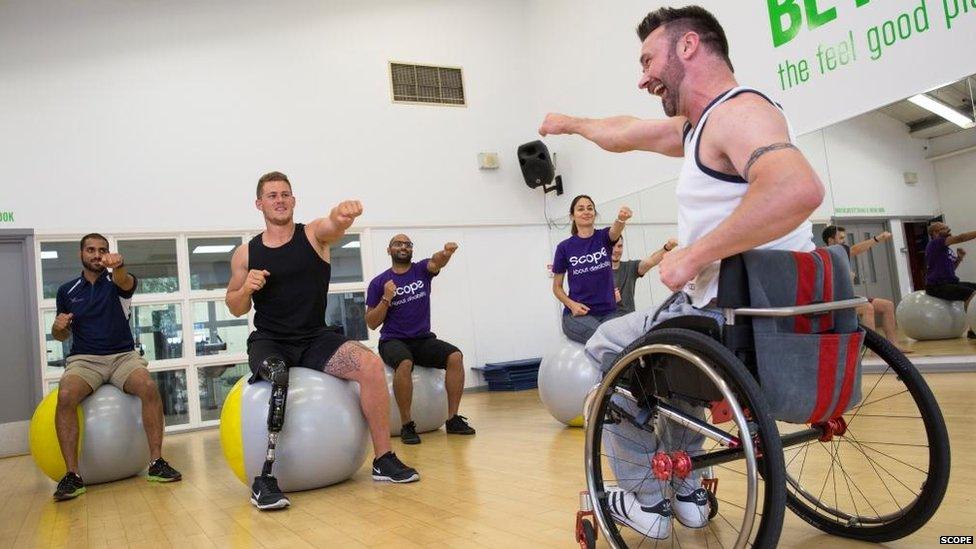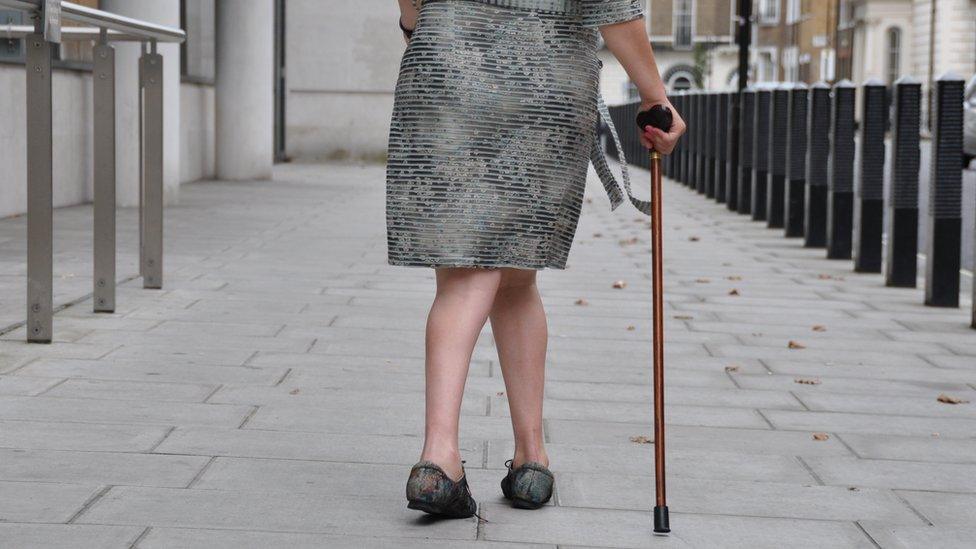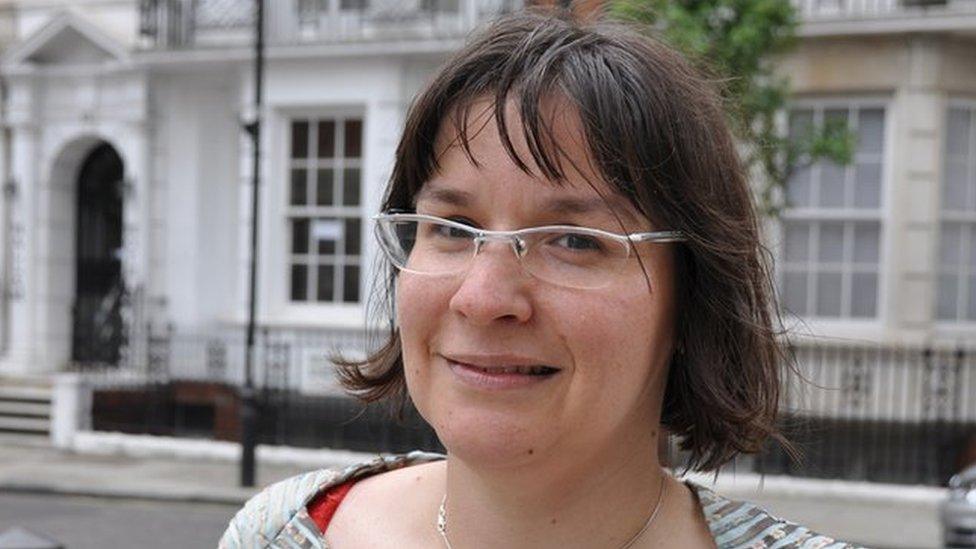Difficulties of getting fit if you're disabled
- Published
- comments

Kris Saunders-Stowe teaching a gym class
My favourite thing about being disabled has always been that no-one expects me to do any exercise.
I have cerebral palsy (CP) and the assumption that I couldn't take part in sport while growing up was one I was happy to embrace because I hate physical exercise.
So imagine my frustration when Paralympics 2012 came to London and disabled people the world over seemed to be getting sporty. Every other taxi driver would ask me if I was going to take up sprinting.
Though the Paralympics loomed large, it turns out I am not the only disabled person who dislikes taking part in sport. According to new research by Scope, although most disabled people think the London Paralympics showed they can achieve great things, only 5% of them were actually inspired to do more exercise or sport after the games.
The thing about having CP is that I never had to think about keeping fit very much. The way I walk is exhausting, and has always been a workout in itself. As a result, I have spent most of my life being very thin without even trying. For people with CP, this isn't uncommon: there was even a Facebook group called Why Diet When You Can Have Cerebral Palsy? where we'd share our outrageously decadent calorific dinner plans and then laugh about how we planned to burn it all off tomorrow, simply by walking a bit.
But I had to leave that Facebook group because, unexpectedly, I got fat.
In what I now know is a pattern common to people who share my disability, as I hit my thirties, I became less mobile. This meant I did less of my characteristic strenuous walking and put on significant weight for the first time. "Oh yes," said every medical professional I encountered, "this is what happens with CP as you approach middle-age." Great.

Walking is hard work when you have cerebral palsy
So, now I have to watch what I eat and also do exercise.
But this change in my attitude isn't just vanity, I need to shed the extra weight so I can improve my mobility.
I knew that I had to do something physically challenging ... but what?
A physiotherapist once recommended I join a gym and I laughed at her because, well, gyms aren't for me. People tend to stare when you have a disability, and I need to feel comfortable if I'm going to work out.
"I hate the gym," agrees John Dickinson-Lilley, one of Britain's top blind male ski racers. "I have a utilitarian approach to fitness. I have to go to the gym so that I can ski." He's comfortable in the gym he's been attending for the last five years, but he stopped taking his guide dog or cane because of the attention it attracted.
Although it's a necessary evil, I felt nervous about approaching the gym for the first time in my life, especially when I couldn't move as well as I am used to.
Kris Saunders-Stowe, a wheelchair user and qualified fitness instructor tells me that I am not alone in feeling intimidated by a typical gym environment. "Centres don't always help," he says. "There is a lot of ignorance. They need to understand the disabled community more."
Kris met prejudice when taking his instructor qualifications. One tutor told him he should be in "the special class" but it didn't put him off. He believes attitudes are beginning to change, and, in an attempt to fill the gap, he now runs fitness classes for disabled people in Herefordshire. "Legs aren't necessary to keep fit," he says. He took mainstream fitness qualifications, and went on to specialise in working with disabled people. He's about to release an exercise DVD for people with disabilities. The routine is energetic, but assumes the participant is sitting down.
Crucially, Kris says, the kind of fitness he promotes isn't about winning medals. "People assume you want to be a paralympian, but it isn't about becoming a big sports person." For disabled people, the goals can be more modest, but life-changing, he says. "Forget fitness, some people just want to be able to lift their mug."
Kris is supporting Steptember, external, a campaign by Scope to raise money and encourage people to move more, whether they are disabled or not. So next month is a good chance for me to get involved.

Kate Ansell: A reluctant gym-bunny
Ability Bow, a gym in east London, takes away the anxiety that you are being watched due to your difference, because they are dedicated to working with disabled people They have nearly 500 people on their books, and a waiting list. Many people are referred by their GP but some have self-referred after hearing about the results that its members have achieved. "It's tailored to your needs," says Victoria Kent, who founded the gym. "Disability is completely normal here."
While researching how I could improve my fitness levels, I found other disabled people online who are attempting to get fit. One of them advised me to get a heart rate monitor to help me understand how much energy I was using on a day-to-day basis. This was suggested because step-counters are designed with regular walkers in mind, and so tend to underestimate the calories I burn when walking.
I did get a heart monitor, and now switch between this and a Fitbit, which counts steps. I have discovered that walking from my house to the local corner shop, and back again, renders a Magnum ice cream bought in that corner shop almost completely calorie-neutral for someone who walks like me. Not the point of using a heart rate monitor in the first place, I realise, but I do appreciate the information.
It seems unlikely I will ever become a true gym bunny, but it's good to know there are disability-friendly places to go if I change my mind. And if I stop eating so many ice creams and set small goals for myself, it's possible I'll even start to get fit.
Next story: Did BBC3's disability season hit the mark?, external
BBC Three's Defying the Label season came to an end last week. But did it hit the mark? Disabled journalist Frances Ryan thinks it did. READ MORE
Follow @BBCOuch, external on Twitter and on Facebook, externaland on our YouTube, external channel, or email ouch@bbc.co.uk